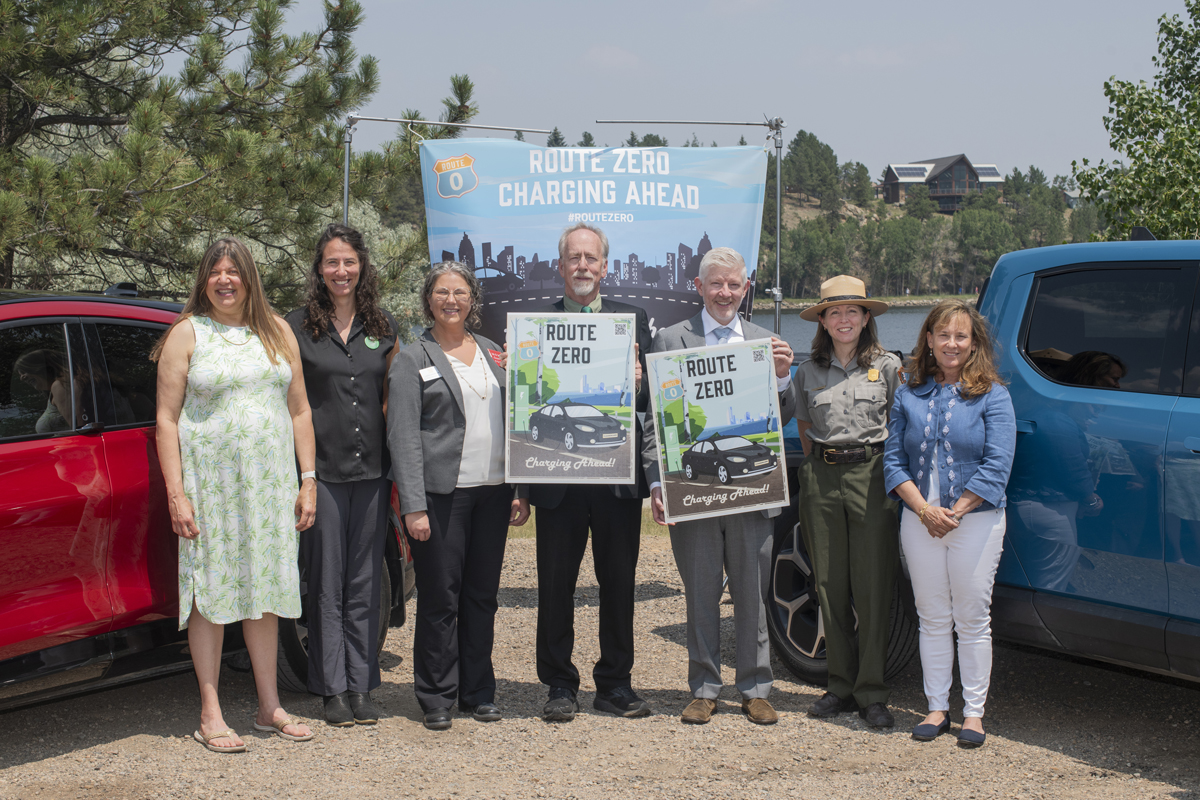Estes Park, CO - On Tuesday, July 23, Mayor Gary Hall of Estes Park and EPA Region 8 Administrator KC Becker gathered with National Parks staff and other clean transportation advocates for a news conference to celebrate the historic federal clean car standards finalized by the Environmental Protection Agency (EPA) for model years 2027 through 2032.
Summer driving season is in full swing, and many families have plans to visit Colorado’s natural wonders, such as Rocky Mountain National Park. Yet the nation's beloved parks are under significant stress due to climate change. Tailpipe pollution fuels climate change, contributing to more frequent and severe extreme weather events in Colorado. With an anticipated 56% of new passenger vehicles to be electric and 16% plug-in hybrids by 2032, the new federal standards are poised to transform the transportation sector. In addition to reducing air pollution, speakers underscored how the new standards will help protect our national parks for future generations.
Mayor Gary Hall of Estes Park emphasized the economic importance of protecting national parks, saying, "Protecting our national parks is crucial, not just for the environment but for our local economies. Rocky Mountain National Park, which attracted over four million visitors last year, along with other parks in Colorado, serves as a significant economic driver for communities like Estes Park. By reducing tailpipe pollution, we can preserve these natural treasures and ensure they continue to attract visitors, supporting local businesses and jobs."
EPA Region 8 Administrator KC Becker addressed the impact of the new standards on air quality, stating, "The new clean car standards are a critical step forward in reducing the pollution that has plagued the Front Range. Poor air quality and extreme weather events are direct threats to our parks and communities. These standards will help us combat these issues and create a healthier environment for all. In Colorado, transportation is a leading source of air pollution, contributing to ozone levels that frequently exceed federal standards. By advancing clean car standards, we can significantly reduce pollution, improve public health, and protect the natural beauty of our state"
Travis Madsen, Transportation Program Director at the Southwest Energy Efficiency Project, highlighted the advancements in electric vehicle technology, saying, "Electric vehicles are becoming more affordable and widely available. The new clean car standards will accelerate this progress, making it easier for more people to choose clean, efficient transportation options. By promoting EV adoption, we can tackle our largest source of climate-warming emissions while also saving millions of dollars on getting around."
Kyle Patterson, Management Specialist/Public Affairs Officer, Rocky Mountain National Park, emphasized the vulnerability of national parks to climate change, stating, "National parks like Rocky Mountain National Park are ecologically sensitive areas that are particularly vulnerable to climate change and extreme weather events. Transportation emissions are one of the major contributors to this threat. Reducing tailpipe pollution from cars is crucial in our efforts to preserve the beauty and unique quality of our national parks for future generations. Every step we take, whether as individuals or through state and federal initiatives, helps protect these irreplaceable natural treasures."
Margaret Kran-Annexstein, Director of the Colorado Sierra Club, discussed the broader implications of climate change, noting, "Extreme weather events are increasingly damaging our national parks, from droughts, to devastating wildfires, to unprecedented flooding. These events highlight the urgent need to address climate change. The clean car standards are a significant piece of the puzzle in our fight against the climate crisis. Here in Colorado, transportation is also a major contributor to our severe ozone issues, particularly along the Front Range. By reducing tailpipe pollution, tied with other crucial reforms to make clean transit more accessible, we can improve air quality and protect the health of our communities and our national parks.”
In conclusion, speakers thanked the EPA and the Biden Administration for setting these historic vehicle pollution standards. The Route Zero event was co-sponsored by the Colorado Chapter of the Sierra Club, the Denver Electric Vehicle Council and the National Parks Conservation Association.
A recording of the event is available here. B-roll for the event is available here for the media to use. Still photos from the event are available here. A video message from Colorado Governor Jared Polis is available here.
